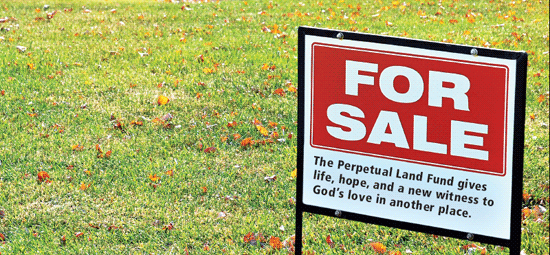|
|

Lifecycle of giving
by Jim Puckett
[Editor’s Note: At the December 2008 Home Missions Board meeting, Jim Puckett presented a recommendation to establish a National Perpetual Land Fund similar to the one established in Oklahoma a few years ago. The board and the staff felt this was a tremendous opportunity to provide interest-free money to Home Missionaries, allowing them to buy land and build sooner, cutting down the time required to reach self-supporting status. The following article explains the fund in more detail.]
There's no more joyous event than the birth of a new baby. Someone has said that a new baby is God's way of saying the world should continue. Children bring happiness and hope to a family like nothing else. In the spiritual realm, the birth of a new church is a time of great rejoicing, bringing new life and hope that God's work will continue.
Physical death is also a natural part of the cycle of life. As much as we dread it, we must accept it. However, we are less likely to accept the decline and death of a church as natural. Yet changing circumstances, demographics, job market, technology, and the local economy can all negatively affect a church, making it impossible to maintain a local congregation.
One church in Oklahoma faced such a dilemma: How to keep the witness of a once-vibrant church alive. The church had been a growing, thriving group with a reputation for outreach and its love for worldwide missions. Visitors heard the gospel and experienced the love and fellowship of God's people.
In more recent years, things had changed dramatically. The community around the church had declined, and the congregation was no longer growing. In fact, decreasing attendance and declining finances made it impractical, if not impossible, to keep the doors open.
In desperation, the church called the Oklahoma State Missions Director, "We must close our doors, but we still want to reach souls for Christ. Help us find a way to perpetuate our love for the Lord and evangelize the world."
This gift gave birth to Oklahoma's Perpetual Land Fund. Any funds received from the sale of church properties are placed in a Perpetual Land Fund and used to help buy properties and build new church buildings. A mission church, often too small to handle a large debt, can borrow from the fund to buy property and build a building. No payment or interest is charged to the mission church for five years.
On the fifth anniversary of the loan, the mission (which by then should be a thriving church) obtains a mortgage on its property to repay the loan to the Perpetual Land Fund. The process is then repeated with another mission church.
Since its small beginning, with only one church contributing, several churches have become donors to the Perpetual Land Fund, giving life, hope, and a new witness to God's love in another place. Four churches that were forced to close their doors now live on through another congregation. Other churches and individuals have contributed to the fund, enabling two new mission churches to receive funds without a financial burden as they focus on growing a new congregation.
In December 2008, the National Home Missions Board adopted this program in hope of speeding up the process of giving birth to a church. The National Perpetual Land Fund is now open for contributions from anyone who want to be a part of a gift that keeps on giving new life and hope for the unreached world.
This fund will be managed by the Church Extension Loan Fund and can be a blessing to mission churches for many years to come. If you have an interest in this program, please contact the National Home Missions Department, and we will work and watch together to see what great things God will accomplish through this fund.
About the Writer: Rev. Jim Puckett has been a Free Will Baptist pastor for many years. An avid supporter of Home Missions, he served for 12 years on the Home Mission Board and several years as mission director for the Oklahoma State Association of Free Will Baptists.
|
|

